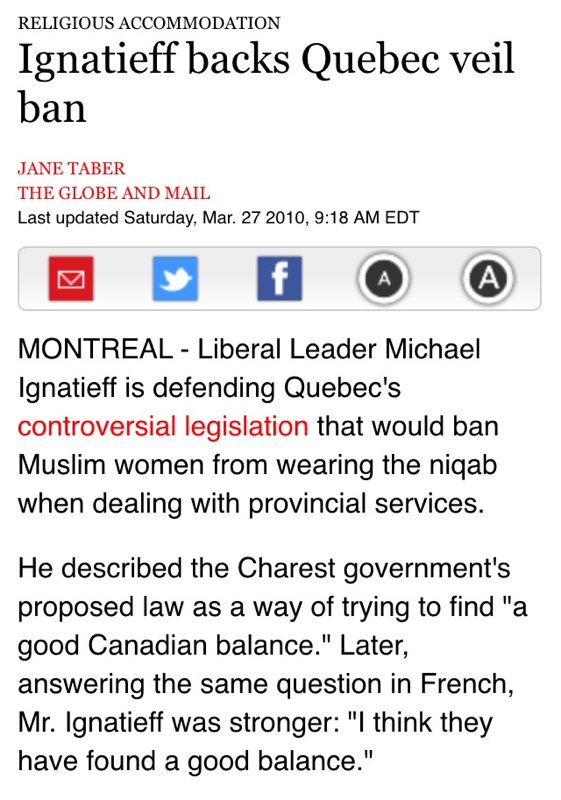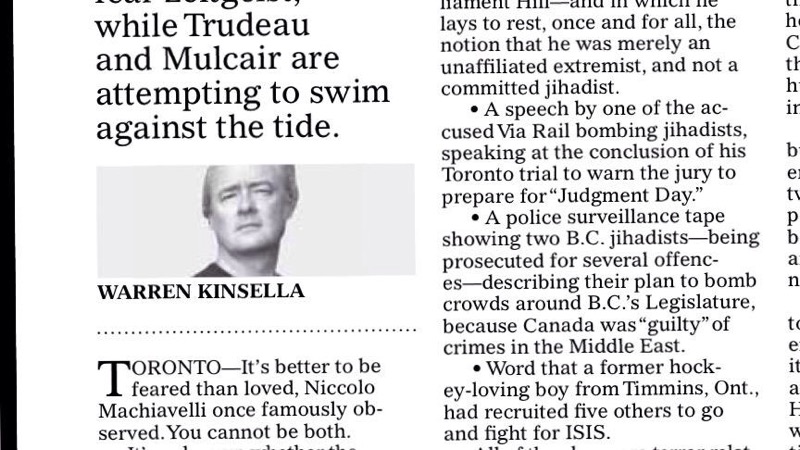It’s better to be feared than loved, Niccolo Machiavelli once famously observed. You cannot be both.
It’s unknown whether the Florentine philosopher’s maxim is playing on the minds of assorted political strategists, these days. But as they squint at the calendar, brooding on the weeks ahead, politicos should heed Machiavelli’s observation. Because fear is decidedly upon the land.
Take, for example, just one day in recent days. On Thursday, the morning papers were filled with the following reports:
· A survey by Pollara Strategic Insights, showing that approximately half of Canadians say they feel less safe from terrorism than they did two years ago – and with two-thirds saying a terrorist attack in Canada is likely in the next five years.
· Revelations about a video filmed by Michael Zehaf-Bibeau, minutes before he commenced a murderous rampage on Parliament Hill – and in which he lays to rest, once and for all, the notion that he was merely an unaffiliated extremist, and not a committed jihadist.
· A speech by one of the accused Via Rail bombing jihadists, speaking at the conclusion of his Toronto trial to warn the jury to prepare for “Judgment Day.”
· A police surveillance tape showing two B.C. jihadists – being prosecuted for several offences – describing their plan to bomb crowds around B.C.’s Legislature, because Canada was “guilty” of crimes in the Middle East.
· Word that a former hockey-loving boy from Timmins, Ont. had recruited five others to go and fight for ISIS.
All of the above are terror-related reports taken from the news media on a single day. And all of the above terror-related reports have a clear Canadian news angle – and do not even include the daily procession of international news stories about ISIS, or al-Shahaab, or al-Qaeda, or Boko Haram, or some other genocidal cult.
Fear – and its lesser cousin, anxiety – are rather complex emotions, but also rather durable, the psychotherapists tell us. They derive from our primeval urge to survive. And, say the experts, it is fear that has most assisted us in doing so, and in getting this far, escaping various predators along the way.
So, humans (generally) – and Canadians (specifically) – can be forgiven for thinking that fear and anxiety are not always illegitimate. They can also be forgiven for shaking their heads at the facile Liberal Party talking head who was pontificating on CBC’s Power and Politics, in the aforementioned news cycle, huffing that “it is the safest time in human history.”
That may be true, statistically, but it is completely irrelevant, emotionally. In a struggle between the political brain and the political gut, the latter will always beat the former. Political choices are mainly a function of emotion, not information.
Progressives always get tongue-tied when talking about emotion, but conservatives positively revel in it. They’re good at it. And that is why Stephen Harper is presently inching towards re-election, and why Justin Trudeau and Thomas Mulcair are not. Harper has captured the fear zeitgeist, while Trudeau and Mulcair are attempting to swim against the tide.
It can’t be done. Of all of the human emotions, fear is arguably the most powerful. And when it is validated by daily headlines – headlines which originate in Timmins or Victoria, and not some Nigerian jungle or Iraqi bunker – it is a juggernaut that cannot be stopped.
Will fear slip from the front pages, as Liberal and New Democrat strategists hope? Perhaps. No one knows. But to this writer, the present jihad rather resembles the Crusades in reverse. And the Crusades, as students of history will recall, lasted about 200 years, give or take. ISIS intend for their crusade to last just as long: just ask them. They’ll tell you.
As they peer at their election calendars, then, plotting out what lies ahead, Liberal and New Democrat strategists know – or should – that, in a contest between love and fear, fear will win.
In this, they are assisted by ISIS and the morning papers, who show no sign of letting up.
Comments (42)


